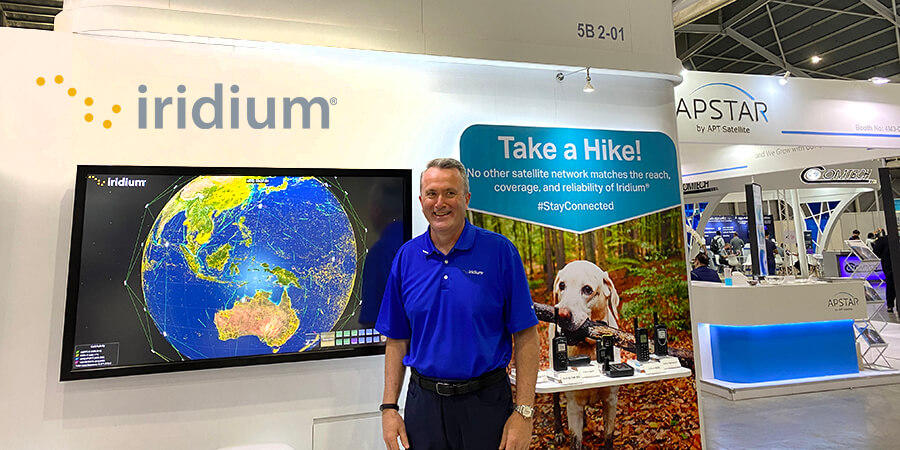With a cross-linked constellation of 66 satellites, Iridium’s global network connects people and things in the world’s most inaccessible locations. Telecom Review Asia Pacific spoke to Bryan Hartin, Executive Vice President, Sales and Marketing, Iridium, to know more about the company’s offerings, market competition, and growth plans.
Growth in IoT is driving increased connectivity worldwide. Can you tell us about Iridium’s growth in the past year?
In 2021, Iridium had the best subscriber growth in the company’s history, with total billable subscribers growing 17% year-over-year, driven by growth in IoT. We rely on the success of our ecosystem of partners to develop, sell, design, and market Iridium-based solutions, while we focus on what we do well. Our constellation is one of the youngest L-band networks worldwide. Presence in low earth orbit gives us the unique advantage in IoT as our satellites are closer to earth, and can hence offer solutions for devices that are a lot smaller. They are also very efficient, lighter and faster than our competition.
In addition, we provide our ecosystem of partners with enabling technology through modules that provide Iridium-based connectivity. Our partners leverage this enabling technology for IoT products and solutions. Some of our IoT solutions are used by heavy equipment OEM companies such as Caterpillar, Komatsu, Hitachi and Doosan, for telematics mainly, and to track their assets worldwide. For some of these OEMs, more money is derived from maintenance parts sales and services, compared to sales of the equipment. Globally, we also have partners who tap on Iridium’s enabling technology to perform vessel monitoring for fishing regulations or research into climate change.
One of the uses in IoT or personal communications is enabling technology that can fit in small devices – with personal communications as an area that is quickly gaining traction. An example of this is Garmin, which uses Iridium enabling technology in small devices to track locations and send SOS messages during an emergency.
Another product is the Iridium Edge Solar, which offers real-time GPS tracking and local wireless sensor and communication capabilities over Bluetooth. It can be placed on a container to track its position, monitor the temperature of the container, or determine if the doors are open or shut.
Essentially, our target is not replacing cellular technology, but complementing it so that connectivity can be maintained even outside terrestrial coverage. We are uniquely qualified to do so because of Iridium’s truly global network, comprised of 66 crosslinked satellites in space with 9 spares on-orbit and another 6 on the ground.
Can you share with us more on Iridium’s award-winning Iridium Certus and how it is designed to match customer needs?
To give you a background, we started as a legacy narrowband company that subsequently added broadband capabilities to our offerings. When we first developed the new network, one of our design criteria was to support broadband.
As L-band is very reliable and resilient, we arrived at the name Iridium Certus as “Certus” is Latin for “certain” and “reliable”. Demonstrating this, our products and services can work under any weather conditions, and is in fact, more resilient than some VSAT providers.
So we ventured into broadband products and then pivoted back to cover the gap between narrowband and broadband to support midband. Our broadband speed ranges up to 704 kilobits per second, which is on the higher end of the speed capability for the L-band. We also rely on 3 world-class value-added manufacturers (VAMs) to build the products – namely Cobham Satcom, Thales and Intellian – that sell our products to service providers, and in turn, take these products and services to all kinds of ships worldwide.
Clearly, maritime shipping is one of the largest markets that uses Certus’ broadband products. Fishing and leisure are also big markets for us. We are also into unmanned surface vessels (USVs) – an area where we are starting to see a lot of interest. Because Iridium operates globally, we are able to provide constant connectivity to support autonomous vessels. We are also well-positioned to provide aviation safety services, primarily in cockpits, as well as land products that ensure vehicles stay connected. For instance, ministries of defense and governments use Certus land products for deployed operations.
How do you expect satcoms to evolve in the foreseeable future?
Currently, we are seeing a lot of new entrants in the market, which bodes well for the satellite business. However, some of these new players are focused on higher-speed services and would be competing with companies to offer residential broadband. While we see opportunities to work with some of these new entrants, we are mostly focused on staying in our lane and growing that lane a bit wider – especially in IoT.
Moving forward, a gamechanger for the satellite industry is enabling technologies for smartphones – an emerging area that we are uniquely qualified to support. With more than 25 years of experience, we have provided consistent and meaningful growth for our shareholders and we are committed to continuing with that.
The Asia Pacific, being a region where Iridium is doing very well, will continue to be a market where we will grow and expand into new areas. For instance, many fishing companies in Asia require reliable satellite communications. And Singapore, being a major port city, is an important market for Iridium as ships arrive from all over the world. Finally, in Asia, aviation is another important market as OEMs with facilities in the region, such as the likes of Boeing and Airbus, rely on Iridium to operate efficiently across the globe.






